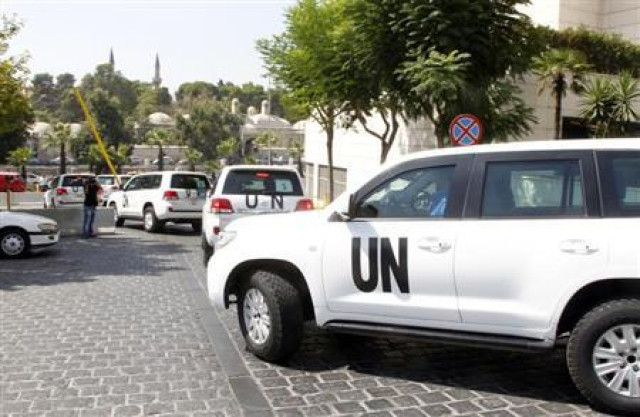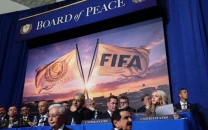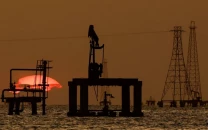UN inspectors reach Syria gas victims, despite coming under fire
Syrian state television blamed rebel "terrorists" for the shooting.

UN vehicles transport a team of UN chemical weapons experts to the scene of a poison gas attack outside the Syrian capital last week, in Damascus. PHOTO: Reuters
Military chiefs from the United States and its European and Middle Eastern allies met in Jordan for what could be a council of war should they decide to punish Syria for the worst reported chemical weapons attack in 25 years.
Washington says President Barack Obama is considering options to respond to what the United States believes was the mass gassing of civilians by President Bashar al-Assad's forces on August 21. Many hundreds of people died in Damascus suburbs in what appears to have been the worst chemical weapons attack since Saddam Hussein gassed thousands of Kurds to death in 1988.
UN investigators crossed the frontline from the centre of the capital, which remains under Assad's control, to inspect the Mouadamiya suburb, one of at least four neighbourhoods hit by poison gas last Wednesday before dawn.
The UN said one vehicle in its convoy was crippled by shooting by "unidentified snipers", but mentioned no injuries. They continued on after turning back for a replacement car.
"I am with the team now," a doctor who uses the name Abu Karam told Reuters by telephone from Mouadamiya. "We are in the Rawda mosque and they are meeting with the wounded. Our medics and the inspectors are talking to the patients and taking samples from the victims now."
Wassim al-Ahmad, an opposition activist, said members of the Free Syrian Army umbrella rebel organisation and the opposition's Mouadamiya Local Council were accompanying the inspectors on their tour of the suburb.
"The inspectors are now examining victims being treated at a makeshift hospital in Mouadamiya and are taking blood samples from them," Ahmad said.
Video filmed at the site showed inspectors in black and blue body armour and blue UN helmets walking through a street as curious onlookers came up to watch.
They shook hands with men who appeared to be rebels wearing camouflage vests, and were accompanied by doctors and local residents. The group descended into the basement of a building where they were told injured survivors were being treated below ground to protect them from more shelling.
Another video showed an inspector interviewing a patient and taking notes.
Activists say at least 80 people were killed in Mouadamiya when the district was hit with poison gas. Hundreds of people were also killed in three other rebel-held districts - Irbin, Ain Tarma and Jobar.
An opposition activist said a large crowd of people gathered to air their grievances to the UN team. There was also a plan for the experts to take samples from corpses.
Sniper attack
The inspectors later returned to their hotel, and within an hour residents reported that the shelling of Mouadamiya resumed.
A UN statement said one of the inspectors' cars had been disabled by bullets as they set out across the front line.
"The first vehicle of the Chemical Weapons Investigation Team was deliberately shot at multiple times by unidentified snipers in the buffer zone area," it said. "It has to be stressed again that all sides need to extend their cooperation so that the team can safely carry out their important work."
Syrian state television blamed rebel "terrorists" for the shooting. The opposition blamed it on pro-Assad militiamen.
The inspectors had been stuck in their downtown hotel since the attack, waiting five days for government permission to visit the scene a few miles away. They had arrived three days before the incident, with a mandate to investigate earlier reported incidents of chemical weapons use.
Speculation has been mounting that Western countries will order some kind of military response to an incident that took place a year after Obama declared the use of chemical weapons a "red line" that would require strong action.
US Defense Secretary Chuck Hagel said any operation would be coordinated with allies: "The United States is looking at all options regarding the situation in Syria. We're working with our allies and the international community."
British Prime Minister David Cameron cut short a holiday to lead a top-level security meeting.
Obama, Cameron and French President Francois Hollande all spoke to each other and to other allies in the past few days.
Top military officers of the United States, Britain, France, other NATO allies and the main anti-Assad countries in the region, including Saudi Arabia and Turkey, met in Jordan on Monday to discuss Syria, diplomats there said.
The conference was pre-planned but had taken on new significance because of the latest events, the diplomats said.
The Chairman of the US Joint Chiefs of Staff, Martin Dempsey, a co-host of the meeting with his Jordanian counterpart, has been one of the voices in Washington urging caution and emphasising the costs of a full-scale military intervention in a war in the heart of the Middle East.
Obama, who withdrew troops from Iraq and is winding down the conflict in Afghanistan, is reluctant to engage in another war. He could look at limited options such as a missile strike to punish Assad without dragging Washington deeper into the fight.



















COMMENTS
Comments are moderated and generally will be posted if they are on-topic and not abusive.
For more information, please see our Comments FAQ